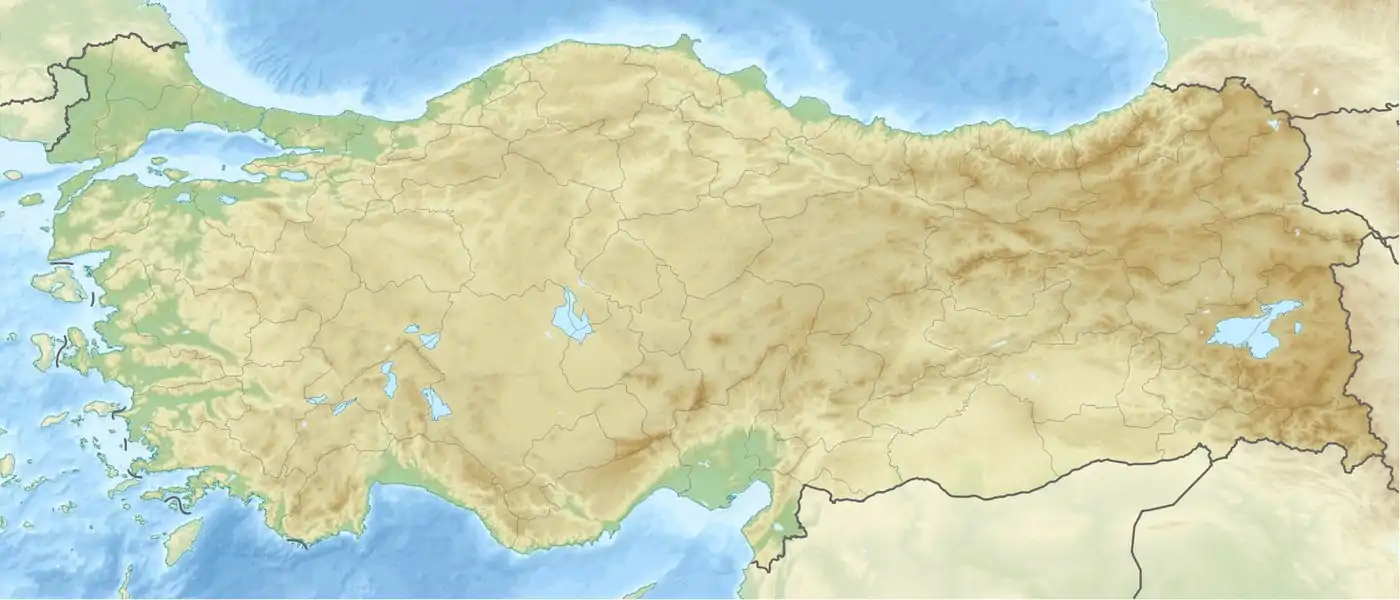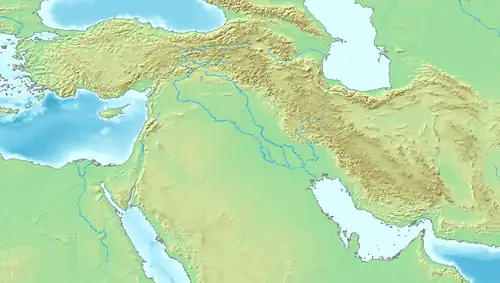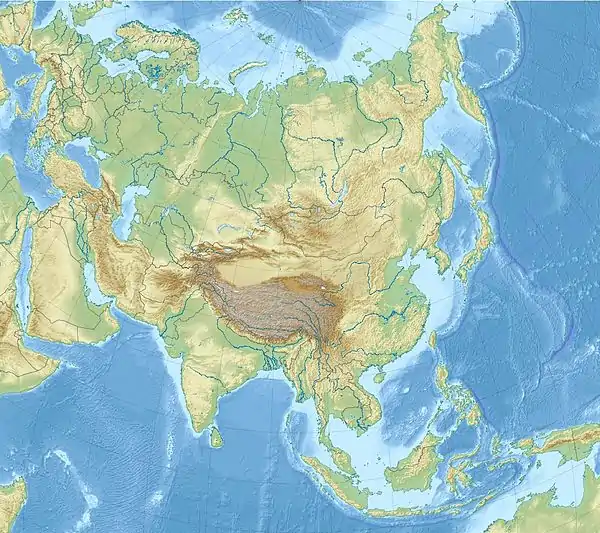Karaca Dağ
Karaca Dağ is a shield volcano located in southeastern Turkey,[1] near Diyarbakır.
| Karaca Dağ | |
|---|---|
 Karapınar Field, looking east on Karaca Mountains in 2012 | |
| Highest point | |
| Elevation | 1,957 m (6,421 ft) |
| Coordinates | 37°40′12″N 39°49′48″E |
| Geography | |
 Karaca Dağ  Karaca Dağ Karaca Dağ (Near East)  Karaca Dağ Karaca Dağ (Asia) | |
| Parent range | Taurus Mountains |
| Geology | |
| Mountain type | Shield volcano |
| Last eruption | Unknown |
It was also known as "Mount Masia",[2] Which in turn was used to give the title of an iris found on the mountain, as Iris masia.[3]
Water Resources
- The streams rising from Karaca Dağ are the most significant water sources in the region. There are also a large number of springs on the southern side of Karaca Dağ and in the northern parts of the region.[4]
- Sanliurfa and specifically the Karaca Dağ area are popular for its spring waters which are sold as bottled water to the world.[5]
- The river Khabur originates from a source at the southwestern slope[6] of the Karaca Dağ and flows into the Euphrates further south at Circesium.
- The river Euphrates does not only originate at the confluence of the Karasu river (north) and the Murat river (northeast) in the Armenian highlands of northeastern Turkey, but in its originally predominant source from the northwestern slope of the Karaca Dağ, through what is known today as the Camcayi Creek.[7]
- The river Tigris does not only originate 74 kms (45 miles) northeast of Diyarbakir and flows through the same city, but it was formerly fed through at least 4 sources from the southeastern slope of the Karaca Dağ, located 33 km (20 miles) southwest of Diyarbakir.[8]
Agriculture
- Researchers at the Max Planck Institute for Plant Breeding Research in Cologne[9] discovered that the genetically common ancestor of 68 contemporary types of cereal still grows as a wild plant on the slopes of Mount Karaca (Karacadag).[10]
Vegetation
- While Karaca Dağ was covered by forest vegetation until 40-50 years ago, today, human activities threaten the plant diversity at Karaca Dağ.[13]
History
- The mountain and area adjacent to the Karaca Dağ is a candidate site for the Garden of Eden.[14][15]
- The northeastern slope of the Karaca Dağ is also a candidate site for Noah's Ark, altar, and tomb.[16]
References
- "Karaca Dag". Global Volcanism Program. Smithsonian Institution.
- Phillips, Roger; Rix, Martyn (1991). Perennials Vol. 1. Pan Books Ltd. p. 216. ISBN 9780330327749.
- Pries, Bob (28 November 2013). "(SPEC) Iris masia Stapf ex Fos". wiki.irises.org (American Iris Society). Retrieved 24 November 2014.
- Güler, Gül; Çelik, Bahattin; Güler, Mustafa (2013). "New Pre-Pottery Neolithic sites and cult centres in the Urfa Region". Documenta Praehistorica. University of Harran. 40: 291–304. doi:10.4312/dp.40.23. Retrieved 2023-07-01.
- "Karacadağ Doğal Kaynak Suyu". Archived from the original on 2022-01-12. Retrieved 2023-07-02.
{{cite web}}: CS1 maint: bot: original URL status unknown (link) - קרלוס הגדול (26 October 2013). "Syria 2005 CIA map.jpg". Retrieved 2023-07-01.
- Lorenz, Thomas (June 2021). "Locations Of Bible History". Fit For Faith Ministries. Retrieved 2023-07-01.
- "MERIT Hydro Visualization and Interactive Map". Google Earth Engine. Retrieved 2023-07-01.
- Max Planck Institute for Breeding Research
- Heun, Manfred; et al. (November 1997). "Site of Einkorn Wheat Domestication Identified by DNA Fingerprinting" (PDF). Science. 278 (5341): 1312–1314. Bibcode:1997Sci...278.1312H. doi:10.1126/science.278.5341.1312. Archived from the original (PDF) on 2006-12-31. Retrieved 2010-08-29.
- "Biodiversity of Turkey: Contribution of Genetic Resources to Sustainable Agriculture and Food Systems" (PDF). Food and Agriculture Organization of the United Nations. Retrieved 2023-07-01.
- "Southeastern Anatolia's super rice ready to adorn dinner tables". Daily Sabah. 2 November 2017. Retrieved 2023-07-01.
- Kaya, Ömer; Ketenoglu, Osman. "A syntaxonomical and synecological research on the steppe vegetation of the Karacadağ Mountain". University of Harran. doi:10.3406/ecmed.2010.1375. Retrieved 2023-07-01.
{{cite journal}}: Cite journal requires|journal=(help) - Spire, Gari (April 2019). "An Expedition to the Garden of Eden". Biblical Research. Retrieved 2023-07-01.
- Lorenz, Thomas (June 2021). "Eden The Land and Garden, Karaca Dag Location in Upper Mesopotamia". Fit For Faith Ministries. Retrieved 2023-07-01.
- Griffith, Kenneth; White, Darrell K. (December 2021). "A Candidate Site for Noah's Ark, Altar, and Tomb" (PDF). 35 (3). Journal of Creation: 50–63. ISSN 1036-2916. Retrieved 2023-01-10.
{{cite journal}}: Cite journal requires|journal=(help)
This article is issued from Wikipedia. The text is licensed under Creative Commons - Attribution - Sharealike. Additional terms may apply for the media files.